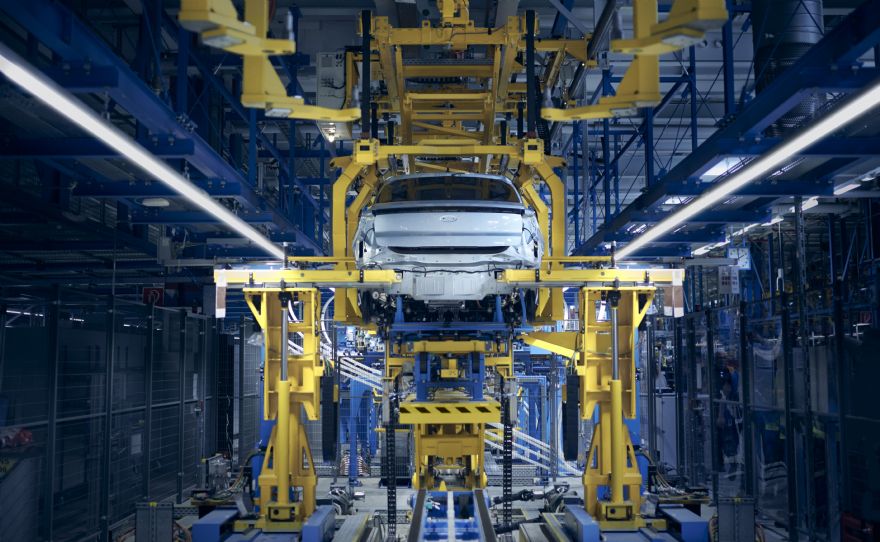 Ford
Ford has opened a hi-tech production facility in Germany this week to build its new generation of electric vehicles (EVs) for millions of European customers. Ford has transformed its historic plant in Niehl, Cologne – founded in 1930 — into the Ford Cologne Electric Vehicle Center, as part of a $2 billion investment.
Designed to be highly efficient, the 125-hectare site is equipped with a brand-new production line, battery assembly and ‘state of the art’ tooling and automation, enabling an annual production capacity of 250,000-plus EVs. Following the successes of the electric Mustang Mach-E, E-Transit and F-150 Lightning, Ford recently unveiled the electric Explorer, which will be the first EV to be produced in Cologne, followed by a second electric vehicle, a sports crossover.
The Cologne EV Center will be Ford’s first carbon-neutral assembly plant to open globally and supports the company’s commitment to reach carbon neutrality across its entire European footprint of facilities, logistics and direct suppliers by 2035.
Executive chair Bill Ford said: “Opening the Cologne EV Center is the start of a new generation of clean manufacturing and EVs in Europe. This facility will now be one of the most efficient and environmentally responsible plants in the entire industry.”
Federal chancellor Olaf Scholz said: “The Electric Vehicle Center represents a fresh start and is the largest investment in the company’s history at the Ford plant in Cologne. This is good news for Cologne, for the automotive industry in Germany, for e-mobility and for the new era.”
Iconic vehiclesThe opening of the Cologne EV Center is the latest chapter in the long history of the Ford Cologne plant, which has been at the heart of the European automotive industry since 1930. Iconic vehicles built at the site have included the Ford Model A, Taunus, Capri, Granada, and Fiesta. For more than 90 years, the Ford plant in Cologne, producing over 18 million cars, has been one of Ford’s most efficient plants worldwide.
Martin Sander, general manager of Ford Model e Europe, said: “The Cologne EV Center signals the start of a new era for Ford in Europe. We are once again redefining automotive manufacturing, implementing advanced technologies to build fully connected, software-defined vehicles that meet our customers’ demand for zero-emission mobility.”
At the core of the Cologne EV Center are digital advancements that connect machines, vehicles and workers. Implementing self-learning machines, autonomous transport systems and big data management in real time are integral to improve the efficiency of the production processes and get better over time, assuring high quality.
Ford is also going a step further to support, not supersede human excellence. New cognitive and collaborative robots, and augmented reality solutions will support its employees and will increase efficiencies and data exchange with other plants to share experiences in real time.
To achieve carbon neutrality, Ford will reduce the use of energy and emissions in the plant by the installation of new processes, machinery, and technologies. All electricity and natural gas required to operate the facility is carbon neutral based on being 100% certified renewable electricity and biomethane.
Carbon neutralityThe heat required to warm the facility and processes is carbon neutral, as the local energy provider will offset the corresponding emissions from the assembly plant on behalf of Ford. The heat is generated by an external power plant and waste incineration plant and provided through a dedicated steam network to Ford.
The local energy provider plans to reduce its operating emissions for this heat delivery by approximately 60% in 2026 and then eliminate these emissions completely by 2035. Once fully operational, Ford Cologne’s EV Center will be independently certified as carbon neutral. This independent certification will be audited and reconciled on a regular basis against purchasing high-quality carbon offsets for any remaining emissions.
The technological upgrade of the Ford Cologne EV Center is accompanied by an ecological improvement of biodiversity and the ecological balance of the existing factory green space. Installed measures include a new perennial forb vegetation, change of ecologically poor grass areas to wildflower meadows and insect hotels as well as bat and bird habitats.
Mr Sander concluded: “The Cologne EV Center is a leading automotive industry showcase for the switch from traditional automotive manufacturing to EV production. The facilities and processes have been designed by our engineers to maximise efficiency and minimise environmental impact, helping Ford become carbon-neutral in Europe and supporting our global decarbonisation plan.”